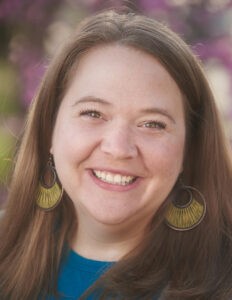On a fateful day during my third-grade year, my family was playing a board game and I was nearing victory. I rolled the dice and landed on a square that read, “Go back 17 spaces.” My family all laughed, as did I, and I jokingly cried, “Aw, dammit!”
My third-grade mind had confused the curse word with its less crude sibling “dang it,” and I did not realize what I’d done until the laughter suddenly stopped. I clearly recall the shock on my sister’s face and the way my mother immediately ended the game and sent me to my room. That was the day I learned there were dirty words and logged my first one as “the D-word.”

Andrea Huffman
There’s another D-word traveling around Christian circles these days, and some ministry leaders seem to respond to it much like my mother and sister did: shock, shut-down, reprimand. That word is “deconstruction,” and despite reactions to the contrary, it is not a dirty word.
In fact, deconstruction is actually what churches have always hoped for — especially with their students. During my 10 years of youth ministry, I can’t even begin to count the times I heard pastors and parents alike express a desire for students to “make their faith their own.” They wanted students to examine their faith for themselves, consider it, dig into it and take ownership of their own beliefs.
In a nutshell, they wanted students to deconstruct.
The presumption, of course, was that their deconstruction process would result in a robust, reconstructed faith, preferably with glaring similarities to that of their parents and pastors. This, as we know, is not what has been happening in our younger generations.
Lately, though, this deconstruction process has expanded beyond just those younger generations. Adults of all ages and stages have found themselves questioning aspects of their faith, their churches and their spiritual upbringings in ways they never have before. Many of the older adults in my own church seem to be finding themselves in a bit of a wilderness — a wilderness of deconstruction — and they aren’t quite sure where to go from here. Many of them, having their eyes opened to things they never before considered, are asking themselves, “What now?”
This is a question churches should be asking themselves too, especially since deconstruction is on the rise (and since it’s not a dirty word). But for those individuals who are asking themselves “what now?”, I’d like to share a few lessons I’ve learned from my own journey.
Deconstruction is like a new world, especially for those of us who still claim Christianity but are leaving behind our faith as we’ve known it thus far. Whether we’re scared of this new world or excited by it (or perhaps a bit of both), the good news is that the possibilities are endless. There is wide open space here with plenty of room for exploration, and I think all of us get to ask ourselves (and God) how we can more faithfully live as Christians now that we’ve found ourselves in this new place.
Here, then, are a few dos and don’ts as you brave your new world:
Don’t be Christopher Columbus. He landed in a new world with the arrogant presumption that because it was new to him, it was new to everyone. He named it, claimed it for his monarchs and acted like he was the first person to discover it, when in fact an estimated 60 million people were already living on the continent.
“You are not the first person in this place, nor are you the first person to wrestle with the theological and social questions you’re asking.”
The same is true for deconstruction. You are not the first person in this place, nor are you the first person to wrestle with the theological and social questions you’re asking. In fact, what you think may be totally new territory is actually a well-populated expanse full of knowledge, thoughtful critique and deep theological truth. It just didn’t fit within the precise mold and market of evangelical Christian subculture, so you probably never heard about it before.
Do seek out and listen to new voices. The people who have been here for a while have a lot to share, especially if they are people on the margins. Read books by people of color and women, especially Black and brown women. Use your social media to start following Black theologians, or female pastors, or gay clergy or trans Christians.
You don’t have to agree with everything you read or every opinion you encounter, but you can at least start listening. That is the beauty of this new wilderness: there is room for multiple voices, and we all benefit from listening to and learning from as many differing voices as possible. Iron sharpens iron, right?
Don’t cheat the process. Don’t immediately look for the right answers or the right thing to believe. That just creates a new fundamentalism on the opposite end of the spectrum. Give yourself time to listen to new voices and to pray. To ponder what you’re hearing from God and others, to consider and question and wonder.
“Give yourself time to listen to new voices and to pray.”
Oh, how beautiful it is to get to wonder! Let yourself sit in the unknown, in the gray areas and in the “what ifs.” Fight the need to immediately replace your old, cemented beliefs with new cemented beliefs.
Do practice theological hospitality. Since you’re trying not to immediately replace old beliefs with new ones and trying not to cheat the process, afford that same grace to others. When you hear a new opinion, don’t decide on it immediately.
Let someone else hold their beliefs without you having to determine if you think they’re right or wrong. Trust that they are on their own journey and that God cares about it even more than you do. You can let them live with their thoughts and processes and beliefs, even if they differ from yours.
Don’t let the haters get you down. There are a lot of people who still treat “deconstruction” like a dirty word or who won’t understand or give you grace for the process you’re going through. They may respond to you in ways that are hurtful or painful. When a friend of mine told her father (a pastor) that she had applied and been accepted into seminary, he frowned at her and said, “So tell me: when did you stop believing in the authority of Scripture?”
There always will be people who don’t understand any deviation from the predetermined path, and for them “deconstruction” might always be a dirty word. Don’t let that stop you from exploring this great beyond, from finding God in this new wilderness. After all, the Israelites met God in the wilderness. Jesus did too. Lots of us have found God out here — and there’s plenty of room for more. Come on in.
Andrea Huffman currently serves as a pastoral resident at Second Baptist Church in Liberty, Mo. She has served in ministry for the last 12 years, during which time she also birthed three children, earned two graduate degrees and bought a partridge for her pear tree. She currently resides in Liberty with her husband and their delightful handful of kids.
Related articles:
Jesus and deconstruction | Opinion by Terry Austin
The deconstruction of American evangelicalism | Opinion by David Gushee
Deconstruction is not a disease, and trying harder is not the cure | Opinion by Amy Hayes
The role of seminaries in guiding ex-evangelicals like me through deconstruction | Analysis by Rick Pidcock


